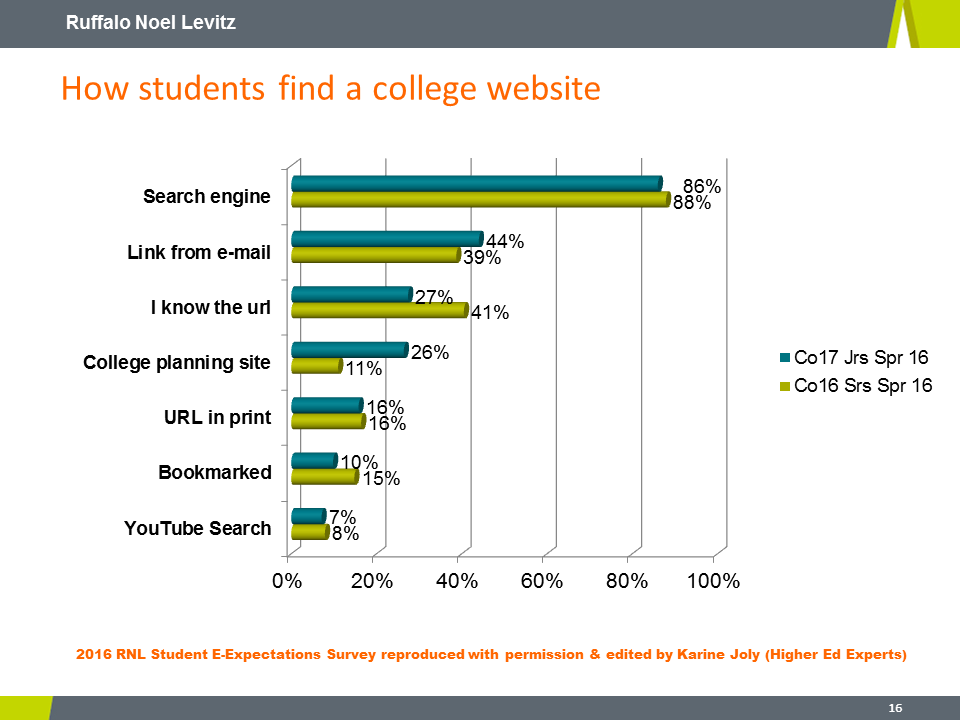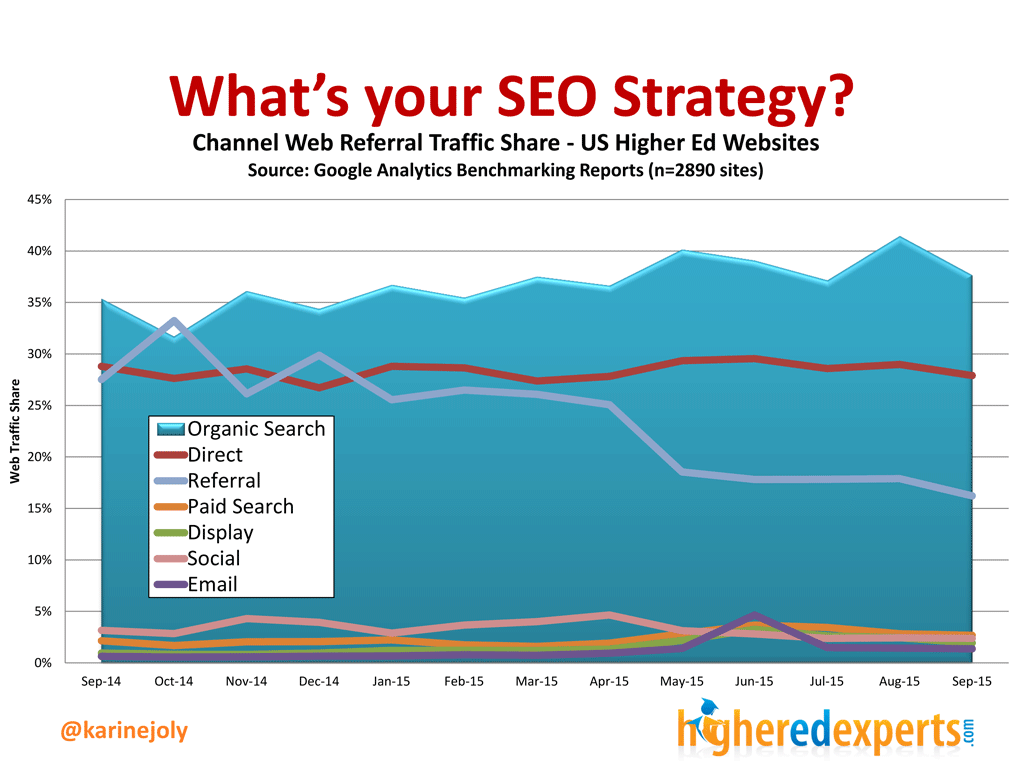![Top Insights on Search Engine Optimization for Higher Ed from the 2016 Student E-Expectations Survey [Exclusive]](http://media.higheredexperts.com/edu/wp-content/uploads/2016/07/RNL-2016-SEO.png)
Exclusive Preview of the 2016 Student E-Expectations Survey Part 3: Organic and Paid Search
This is the 3rd part of the 4-installment series on the April 2016 Ruffalo Noel-Levitz survey results. This survey focuses on the E-expectations of college bound seniors and juniors (n=3,117) and will be officially released Wednesday. If you read the 1st part on social media and the 2nd on higher ed websites, just skip to the next section without reading the short intro below
Stephanie Geyer from RNL shared with me the complete survey data set a few weeks ago to allow me to spend time on analysis. I’ve taken more than 10 hours working on this blog series to make it as useful as possible for you as I know you don’t have THAT time.
The E-Expectations of College-Bound High School Students Survey has become the gold standard of research on the digital expectations and habits of the new class of college freshmen (high school seniors) and the new crop of prospective students (high school juniors).
As you’ll see in some of the charts I’m sharing with you in this post, RNL has also included data from previous surveys.
Here’s the key to understand the abbreviations used in the charts:
- Co16 Jrs Spr 15: Juniors from the spring study in 2015, class of 16
- Co16 Srs Fall 15: Seniors from the fall study in 2015, class of 16
- Co16 Srs Spr 16: Seniors from the spring study in 2016, class of 16
- Co17 Jrs Spring 16: Juniors from the spring study in 16, class of 17
Search Engine Optimization (SEO) for Higher Ed is NOT Optional
As I explained in my previous post about higher ed websites, your school site should be central to your digital strategy to reach out to prospective students. It’s influential, reliable and see as the 1st stop when they have a question.
As a result, you want to make sure students find your school website when they look for it.
According to the survey results, the most popular way to find a college website is to use a search engine. I’m sure this isn’t a big surprise as most of us do rely on search engines to find websites as well (even Siri does when you ask her 🙂

The Benchmarking Study of 8,000 Worldwide Higher Ed Websites I’ve conducted using Google Analytics data paints a similar picture.
Although my study wasn’t deemed interesting enough by the selection committee to make the cut for the AMA Symposium for the Marketing of Higher Education, it does show the importance of search engines in driving traffic to higher ed websites as you can see in the slide of a presentation (focusing on US websites only) I gave at the 2016 Higher Ed Analytics Conference.

Both charts (and studies) give a clear picture of the central role search engines and search engine optimization (SEO) for higher ed play. That’s why I’m amazed at the fact that SEO is still a non-strategic afterthought at most institutions.
And, I still don’t understand why our professional certificate 4-week online course on SEO for Higher Ed is the least popular at Higher Ed Experts – when the need is so high. The course is taught by one of the best SEO strategists in higher ed, Joshua Dodson, who has accomplished wonders in organic search placements for SNHU over the past year. Yet many interested higher ed marketers struggle to get the budget to take it. It’s a paradox, I guess 🙂
SEO Strategy for Higher Ed? Students & Search Keywords
There’s no successful SEO strategy without a deep understanding of how prospective students (and users) search online.
While it might be easy to rank well on the name of your school (although it depends on how many schools share your name), the data indicates the importance of ranking well for the combination of your school name and a given program.

If you have no clue on how your website is doing on this combo of keywords, please spend some quality time with your favorite search engine and find out. Knowledge is power.
If you find that things could get better, why not try to learn more about SEO or hire a specialist? Joshua Dodson has written a great balanced piece on how to decide who should do your SEO with pros and cons for both options.
Online Advertising: Yes, They Click!
Despite what we hear about banner blindness and our own conflicted relationship with online advertising, the E-Expectations Survey found that 52% of Seniors and 47% of Juniors have clicked on a paid ad.
Google search ads are still the most popular.
Facebook ads were also quite popular last year and in the Fall study. A glitch in the survey prevented from collecting data about it in the April 2016 survey, unfortunately.

Next: Insights on Email & Text
Stay tuned (or subscribe to my newsletter) for my next post in this series with insights from the 2016 RNL Student E-Expectations Survey about the roles Email and Text play.
Tags: 2016 E-Expectations Research, Higher Ed News